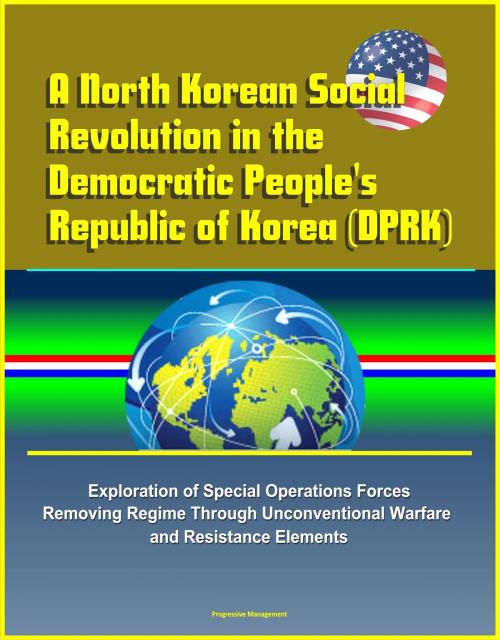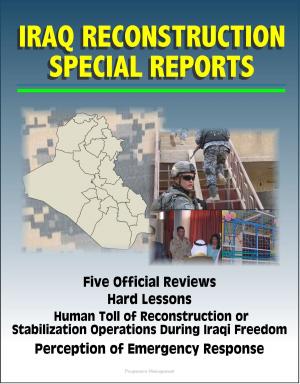A North Korean Social Revolution in the Democratic People's Republic of Korea (DPRK) - Exploration of Special Operations Forces Removing Regime Through Unconventional Warfare and Resistance Elements
Nonfiction, History, Asian, Asia, Military| Author: | Progressive Management | ISBN: | 9781370609826 |
| Publisher: | Progressive Management | Publication: | March 31, 2017 |
| Imprint: | Smashwords Edition | Language: | English |
| Author: | Progressive Management |
| ISBN: | 9781370609826 |
| Publisher: | Progressive Management |
| Publication: | March 31, 2017 |
| Imprint: | Smashwords Edition |
| Language: | English |
This excellent report has been professionally converted for accurate flowing-text e-book format reproduction. The Democratic People's Republic of Korea (DPRK) regime has increasingly become a global threat since the end of the Korean War. Their nuclear arms violations and human rights infringements have drawn the concern of the international community. The closed economy, tightly-controlled international borders, and indoctrinated population make it extremely difficult for the international community to influence or persuade the regime in Pyongyang to cease its problematic behavior. To change the government of the DPRK, North Koreans must remove the regime, and the most feasible way is to remove it from within. North Koreans are so heavily indoctrinated ideologically that it would be impractical to attempt to coerce them to reject it and oust their leader, whose reign rests on the direct lineage of the "father" of the DPRK. North Koreans lack the knowledge, skill, and reason to revolt against the DPRK regime, but a select group of North Korean defectors and the assistance of a special operations element could facilitate a social revolution through the means of unconventional warfare. In the event of a social revolution gaining popularity and becoming effective in the removal of the DPRK regime, several states with different political and economic goals would likely conduct unconventional warfare (UW) in support of that particular state's interest. This research explores ways special operations forces could remove the DPRK regime by way of unconventional warfare through an existing resistance element. This is not to imply that the US is planning or would conduct such operations; it is only meant as a way of offering a look at what such operations - conducted by any external actor - might look like.
The current environment in the DPRK is ripe for a social revolution that could lead to a regime change. Constant oppression of North Koreans by a militaristic and paranoid regime has thus far prevented an overt social revolution. The DPRK regime brutally executed North Koreans accused of attempting or plotting to overthrow the regime, such as Kim Jong-Un's late uncle, Jang Song-thaek, in December 2013. The population lives in such fear that any image of Kim Jong-Un, on any type of medium, cannot be placed on the ground, thrown away, sat on, or manipulated in any other way that my imply disgrace to the dictator. Any such act would result in imprisonment at a labor camp, along with the current and future generations of that person's family. Historically, oppressed people rise up against ruthless dictators and regimes to better their lives. North Koreans are justified in starting a social revolution, which could be successful with assistance from special operations forces (SOF) that support such causes. In the event of a social revolution gaining popularity and becoming effective in the removal of the DPRK regime, several states with different political and economic goals would likely conduct unconventional warfare (UW) in support of that particular state's interests.
This excellent report has been professionally converted for accurate flowing-text e-book format reproduction. The Democratic People's Republic of Korea (DPRK) regime has increasingly become a global threat since the end of the Korean War. Their nuclear arms violations and human rights infringements have drawn the concern of the international community. The closed economy, tightly-controlled international borders, and indoctrinated population make it extremely difficult for the international community to influence or persuade the regime in Pyongyang to cease its problematic behavior. To change the government of the DPRK, North Koreans must remove the regime, and the most feasible way is to remove it from within. North Koreans are so heavily indoctrinated ideologically that it would be impractical to attempt to coerce them to reject it and oust their leader, whose reign rests on the direct lineage of the "father" of the DPRK. North Koreans lack the knowledge, skill, and reason to revolt against the DPRK regime, but a select group of North Korean defectors and the assistance of a special operations element could facilitate a social revolution through the means of unconventional warfare. In the event of a social revolution gaining popularity and becoming effective in the removal of the DPRK regime, several states with different political and economic goals would likely conduct unconventional warfare (UW) in support of that particular state's interest. This research explores ways special operations forces could remove the DPRK regime by way of unconventional warfare through an existing resistance element. This is not to imply that the US is planning or would conduct such operations; it is only meant as a way of offering a look at what such operations - conducted by any external actor - might look like.
The current environment in the DPRK is ripe for a social revolution that could lead to a regime change. Constant oppression of North Koreans by a militaristic and paranoid regime has thus far prevented an overt social revolution. The DPRK regime brutally executed North Koreans accused of attempting or plotting to overthrow the regime, such as Kim Jong-Un's late uncle, Jang Song-thaek, in December 2013. The population lives in such fear that any image of Kim Jong-Un, on any type of medium, cannot be placed on the ground, thrown away, sat on, or manipulated in any other way that my imply disgrace to the dictator. Any such act would result in imprisonment at a labor camp, along with the current and future generations of that person's family. Historically, oppressed people rise up against ruthless dictators and regimes to better their lives. North Koreans are justified in starting a social revolution, which could be successful with assistance from special operations forces (SOF) that support such causes. In the event of a social revolution gaining popularity and becoming effective in the removal of the DPRK regime, several states with different political and economic goals would likely conduct unconventional warfare (UW) in support of that particular state's interests.















